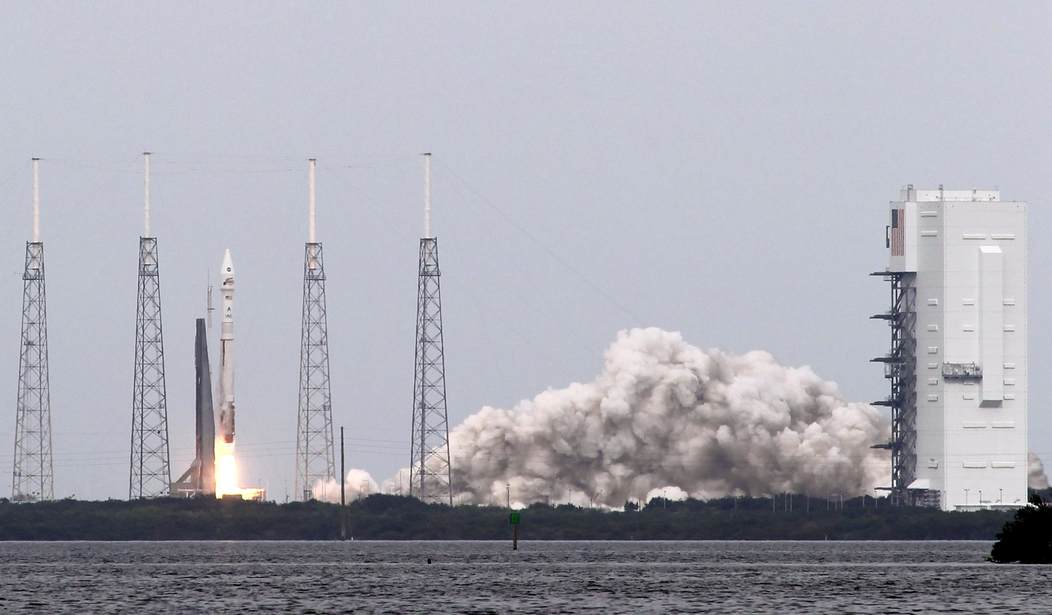WASHINGTON — The outcome of dueling versions of the National Defense Authorization Act could determine how much the U.S. lines Russia’s pockets before what some lawmakers hope is a speedy transition to a domestically produced rocket engine.
The RD-180 engine is built by NPO Energomash, a manufacturer mostly owned by the Russian Federation. It’s used in the Atlas V rocket, built by Lockheed Martin and Boeing’s United Launch Alliance.
The House version of the NDAA approves all of the 18 requested engines. In the Senate, where there has been a lengthy battle over buying from Russia, the NDAA authorizes nine engines.
Either way, the Kremlin’s defense industrial complex stands to gain a quarter billion to half a billion taxpayer dollars. Add that to the billion they’ve already made from RD-180 engine sales to the U.S. And add on top of that questions about how much is directly going to individuals sanctioned after Russia’s invasion of Ukraine and occupation of Crimea.
In a December floor speech, McCain argued against a provision in the omnibus spending bill to lift the restrictions on the use of Russian-made rocket engines passed in the FY 2016 defense bill, calling it “the triumph of pork barrel parochialism.”
The ban was included in the last NDAA, he noted, “because our nation should not rely on Russia to access space” and “because it is simply immoral to help subsidize Russia’s intervention in Ukraine and line the pockets of Putin’s gang of thugs who profit from the sale of Russian rocket engines.”
McCain accused Sens. Richard Shelby (R-Ala.) and Dick Durbin (D-Ill.) of “secretly, non-transparently” working to overturn the restriction.
The ULA rockets are built in Alabama, and Boeing is headquartered in Illinois.
“The result will enable a monopolistic corporation to send potentially hundreds of millions of dollars to Vladimir Putin and his corrupt cronies and deepen America’s reliance on these thugs for our military’s access to space,” McCain continued.
“This is outrageous. And it is shameful. And it is the height of hypocrisy, especially for my colleagues who claim to care about the plight of Ukraine and the need to punish Russia for its aggression. How can our government tell European governments that they need to hold the line on maintaining sanctions on Russia, which is far harder for them to do than us, when we are gutting our own policy in this way? How can we tell our French allies, in particular, that they should not sell Vladimir Putin amphibious assault ships, as we have, and then turn around and try to buy rocket engines from Putin’s cronies? Again, this is the height of hypocrisy.”
McCain called it “nonsense” to assert that a domestically produced engine for defense space needs couldn’t be finished before 2022.
Shelby and Durbin were successful in their omnibus gambit, with Shelby at the time deriding “the reckless restriction put on the use of the RD-180, which undermines our national security.”
“This language directly addresses the concerns of our nation’s military leaders who argue that there will be a multi-year gap in access to space for national security launches under current policy,” Shelby said. “While I strongly believe that we should not be dependent upon any foreign power for access to space, it is far too risky to ban the RD-180 until we have a domestically-produced engine that has the same capabilities.”
In January, McCain responded by introducing legislation to “repeal the provision permitting the use of rocket engines from the Russian Federation for the evolved expendable launch vehicle program.” Sens. Joni Ernst (R-Iowa) and Claire McCaskill (D-Mo.) are co-sponsors.
The bill sits in McCain’s Senate Armed Services Committee.
Durbin fired back at McCain in a February Wall Street Journal letter that “it will take at least five years before we have an American-made substitute rocket engine and… to prohibit the use of Russian rocket engines before then could endanger our national security.”
“My colleague from Arizona is unmoved by that warning,” Durbin wrote, adding that McCain’s plan for domestic rocket engine development “would likely cost taxpayers in excess of a billion dollars more” than the plan for Russian engines.
Durbin is a co-chairman of the Senate Ukraine Caucus and has called on the Obama administration to arm Kiev. “A timely increase in U.S. military aid is critical for Ukraine to defend its borders against brazen and violent Russian aggression in the east… more can and must be done for Ukraine, including defensive weapons as soon as possible,” the senator said in March 2015 after President Obama approved increased nonlethal aid for Ukraine.
Shelby promoted keeping “those engines, a number of them, for a few years …for our national security” at an April 27 hearing on the NDAA with Defense Secretary Ashton Carter.
“Down the road, we want to have two or more competitive launch service providers that are purely American. That’s where we’d like to get to. In the meantime, we have to launch our national security payloads,” Carter said.
“We can hold our noses, buy RD-180s until that situation is created. Or — and fly Atlases with RD-180s. The alternative is to fly our payloads on Delta, which is technically feasible, but much more expensive,” he added. “And so, that’s the choice. And we have chosen the choice of going Atlas, recognizing the distasteful fact that that necessitates purchases of up to 18 more RD-180 engines.”
Government officials aren’t in complete agreement: while Air Force Secretary Deborah Lee James wants no less than 18 engines, Director of National Intelligence James Clapper has testified that there are American rockets that can do the job for military- and intelligence-related space trips.
At a May 19 event at the Brookings Institution, McCain said “this isn’t the military industrial complex — this is the military industrial congressional complex. This is corruption.”
The senator reference “recorded remarks of one of the executives of ULA which were then published where he said that the Defense Department leaned as far as they could in the direction of ULA as opposed to SpaceX.”
“Jeff Bezos and his outfit [Blue Origin], they’re building rocket engines. They’re not getting any money from the federal government to do it. Elon Musk [of SpaceX] is just revolutionized with the whole business because now you can recover the whole rocket. I mean, it’s incredible,” McCain continued.
“This is why we need this reform, the reforms that I’m talking about because we need more Elon Musks and Jeff Bezos’ in the business rather than — as much as I love them, rather than the traditional big five that control most of the contracts. This is the circle of the DoD, the Congress and the industry. And it’s disgraceful.”








Join the conversation as a VIP Member